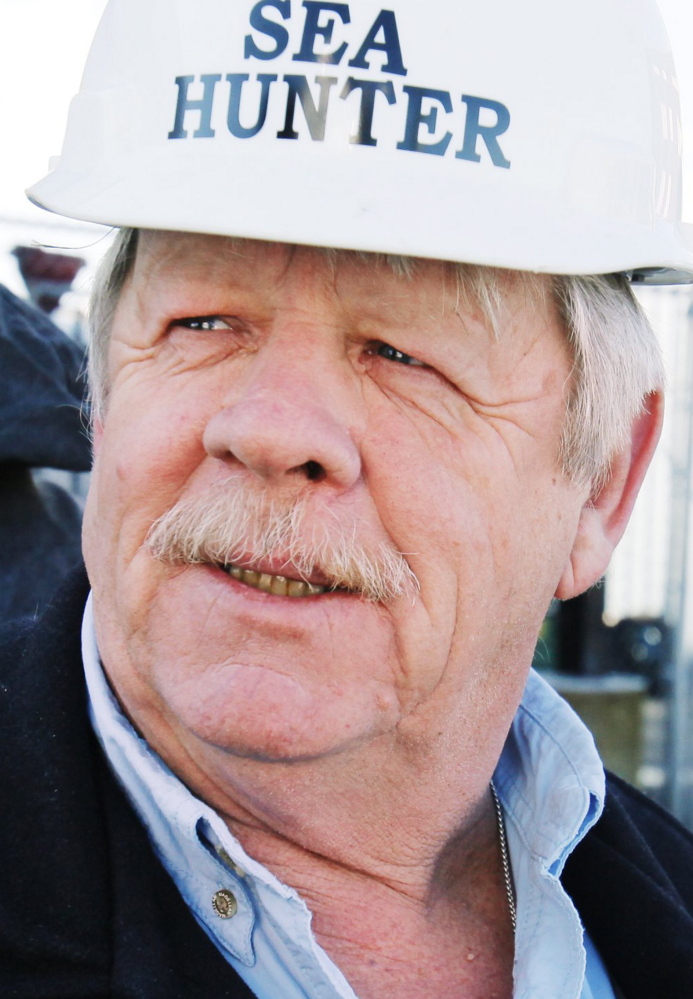A Gorham treasure hunter who has been salvaging a World War II-era shipwreck off Cape Cod for six years admitted in a sworn affidavit that two documents he offered as proof that riches were hidden aboard the ship were fabricated.
But Greg Brooks said he played no role in procuring the historical documents and didn’t know they were fake until about two weeks ago. If the fabricated documents were used to solicit investments, it could constitute fraud.
Brooks’ admission also complicates the battle over salvage rights to the SS Port Nicholson that continues to play out in federal court.
In his brief affidavit – dated Nov. 25 but not filed in U.S. District Court until Thursday – Brooks said his former researcher, Edward Michaud, contacted him on Nov. 22 saying he needed to see Brooks immediately.
Michaud, who lives in Framingham, Massachusetts, had been contracted by Brooks’ company, Sub Sea Research, to conduct historical research of the Port Nicholson. He worked with Brooks on other shipwreck salvages in the past.
Brooks wrote that when he and Michaud met the next day in Maine, Michaud disclosed that he had fabricated two documents that had been admitted as evidence in 2012 in the ongoing court case.
“I was stunned and extremely dismayed,” Brooks wrote in the affidavit. “He had previously told me that he had obtained the documents from a well-connected contact of his named Jack MacCann, formerly of the Office of Naval Intelligence. I asked him, ‘What about Jack MacCann?’ He replied, ‘I made him up.’ “
Michaud is now the subject of a federal investigation, according to court documents. It’s not clear whether Brooks also will be targeted.
Brooks made it clear in his affidavit that he had neither a role in the research nor expertise in that area.
He also stressed that he had no idea the documents were not authentic.
“Mr. Michaud had never indicated or even hinted that any of the copies of documents furnished to Sea Hunters had been altered or falsified in any way,” Brooks wrote. “I certainly did not ask Mr. Michaud to furnish altered or falsified documents; and I would never consent to file with the court any documents that I did not believe were genuine.”
Brooks and his crew were first awarded temporary salvage rights to the Port Nicholson in 2008. At the time, he didn’t know the ship’s identity, only that it was sitting 700 feet or so below the surface about 50 miles off Cape Cod.
Brooks has been a treasure hunter for three decades, his hunts funded primarily by investors who sign on with the promise that they will receive a cut of any treasure.
Yet, while he has been actively involved in many salvage efforts, he has never found anything of significant value.
In the first few years on the Port Nicholson operation, Brooks and his salvage crew spent several weeks at sea without making any progress. In periodic filings with the court, he blamed bad weather and equipment issues.
In early 2012, Brooks’ company sent statements to the media indicating that they had proof that the Port Nicholson was carrying a secret cache of platinum when it was sunk by German U-boats in 1942.
Those platinum bars would be worth an estimated $3 billion, Brooks said.
It was only a few months later that Brooks filed another status update with the court and offered documents as proof that the treasure was there – although in later status updates Brooks would admit he had concerns about their authenticity.
If falsified documents were used to secure investments, it could be a form of investor fraud. However, court documents suggest that most of the money raised in 2012 came before the discovery of the fabricated evidence.
Brooks has been under investigation by the Maine Office of Securities since April.
By mid-2012, two things happened that complicated the salvage of the Port Nicholson.
The first was the filing of what’s known as an intervener claim by the Department of Transport for the United Kingdom claiming ownership of the wreck.
Timothy Shusta, a Florida attorney representing the U.K., said he doesn’t believe the ship contains anything of value but contended that, nevertheless, it still belongs to its country of origin.
A judge granted intervenor status to the United Kingdom, but the salvage continued because the claim would only matter if treasure were found.
Shusta and another attorney, Michael Kaplan of Portland, have pushed Brooks to provide proof and documentation.
Also in 2012, a group of investors in the Port Nicholson operation, led by Daniel Stochel of New York, broke away and filed a petition with the court seeking to wrest salvage rights from Brooks.
Stochel and others he represented through an investment firm gave millions to Brooks but had lost faith in his abilities to recover any treasure.
A judge has not yet ruled on the petition by Stochel’s group, Mission Recovery.
While the case has meandered through the legal system, Brooks and his crew have continued to salvage, but he has yet to recover any platinum.
Eric Russell can be contacted at 791-6344 or at:
Twitter: @PPHEricRussell
Send questions/comments to the editors.




Success. Please wait for the page to reload. If the page does not reload within 5 seconds, please refresh the page.
Enter your email and password to access comments.
Hi, to comment on stories you must . This profile is in addition to your subscription and website login.
Already have a commenting profile? .
Invalid username/password.
Please check your email to confirm and complete your registration.
Only subscribers are eligible to post comments. Please subscribe or login first for digital access. Here’s why.
Use the form below to reset your password. When you've submitted your account email, we will send an email with a reset code.